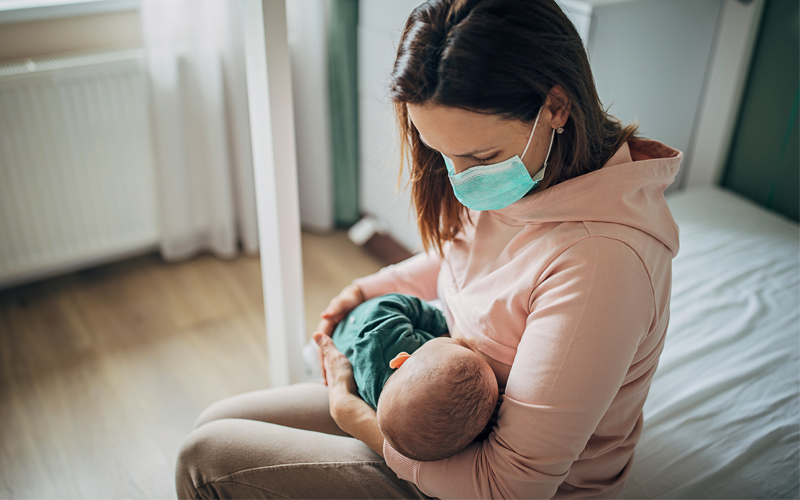It’s already a proven fact that breastmilk carries antibodies that help babies develop stronger immune systems and protect them from a host of illnesses, including ear infections, urinary tract infections, colds and flu. But can breastfeeding boost COVID-19 immunity in infants? According to two recent studies, the answer is yes.
A study published in March 2021 in the American Journal of Obstetrics & Gynecology, followed 131 women of reproductive age (84 pregnant, 31 lactating and 16 non-pregnant). All 131 women received one of the two mRNA COVID-19 vaccines currently available, either the Pfizer BioNTech vaccine or the Moderna vaccine.
The results demonstrated that both mRNA vaccines produced antibodies effective in fighting SARS-CoV-2, the virus that causes COVID-19. The results also showed that the vaccine conferred protective immunity to newborns through both breastmilk and the placenta.
A second study, published in April 2021 in the Journal of the American Medical Association, followed 84 women who received the Pfizer BioNTech vaccine. Nearly all (97%) of study participants had elevated breast milk antibodies, with many showing strong production of IgA and IgG antibodies in their breastmilk for a full six weeks after vaccination.
“It’s important to note that this type of immunity is considered passive immunity,” says International Board-Certified Lactation Consultant Phyllis Young with The Birth and Family Center at Grand View Health. “It’s not the same as a baby getting a vaccine — which babies can’t do. But some of the latest data I’ve seen show this level of passive immunity lasting in breastmilk for 9 to 10 months for both mom and baby. It’s pretty amazing.”
For optimum immunity benefits against COVID-19, Young recommends exclusive breastfeeding. “The amount of passive immunity an infant receives is dose dependent,” she says. “That means babies who breastfeed exclusively will receive the biggest immune boost, while those who receive pumped breastmilk and those who receive both formula and breastmilk may see lower levels of passive immunity.”
According to a study published in the New England Journal of Medicine in June, both COVID-19 mRNA vaccines are safe and effective for pregnant women. So too is the single-dose Johnson & Johnson vaccine. However, the Centers for Disease Control and Prevention warns that women under age 50 should be aware of the rare risk for blood clots that has been identified in some people who received the J&J vaccine.
Moms are also safe to receive a COVID-19 vaccine right after giving birth to a full-term baby. “If you deliver prematurely, some neonatologists say it’s wise to wait six weeks before getting a COVID-19 vaccines, but that opinion isn’t yet backed up by data,” Young says.
At The Birth and Family Center at Grand View Health, our International Board-Certified Lactation Consultants are available to moms seven days a week. They help all moms establish and sustain breastfeeding, especially in complex or high-risk situations. Learn more about them.

